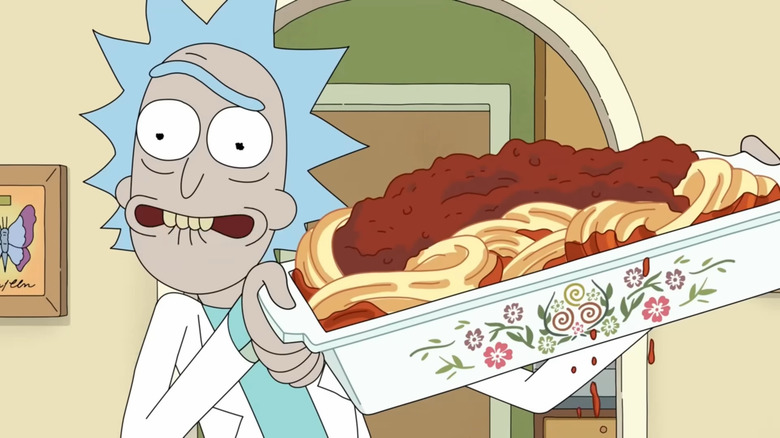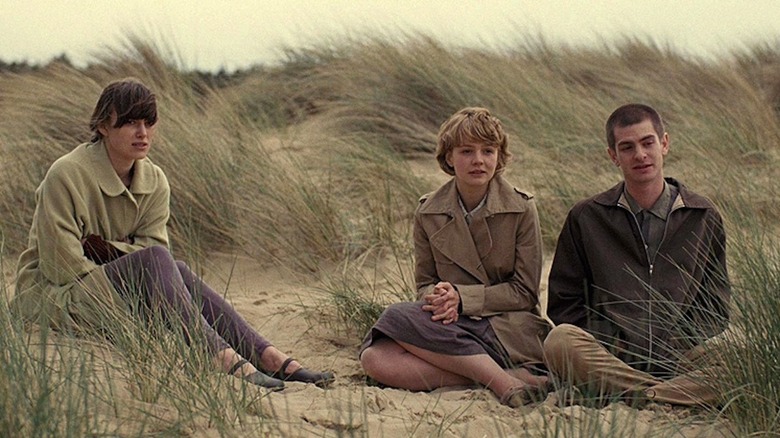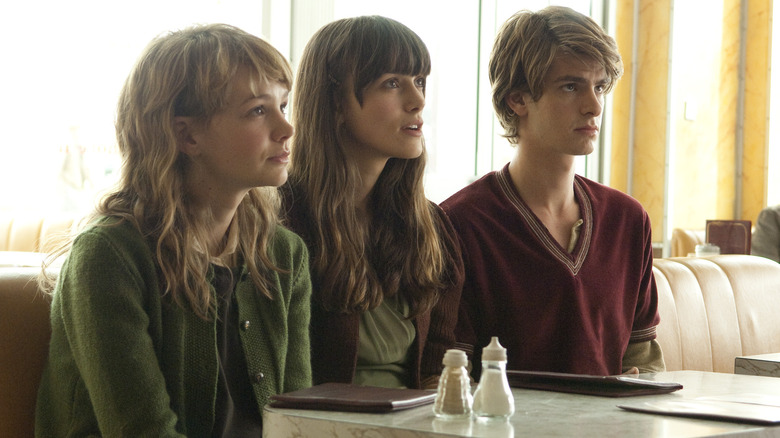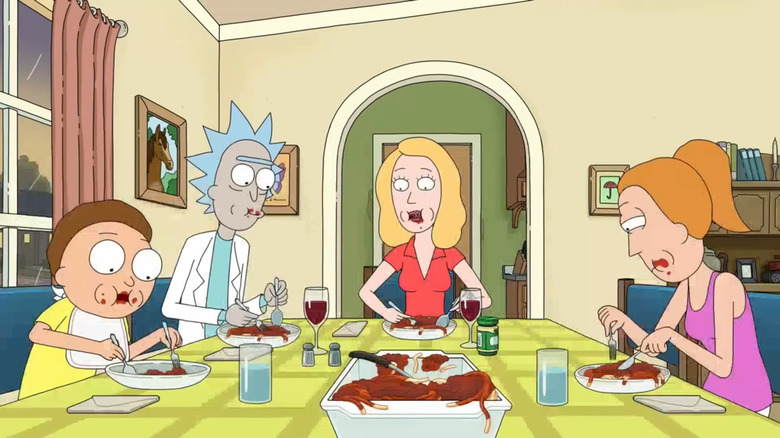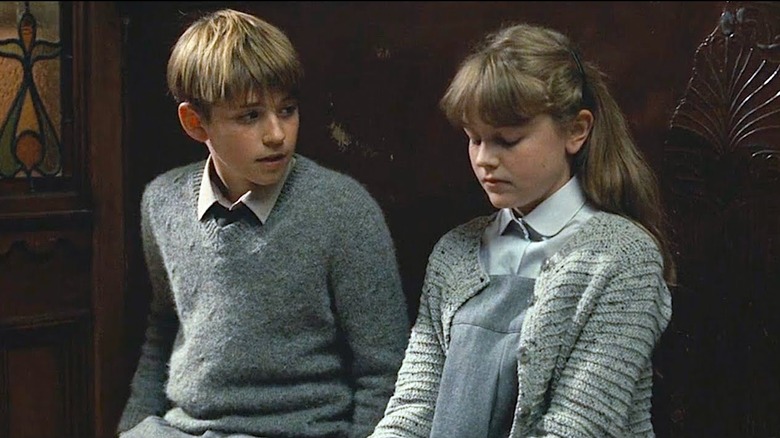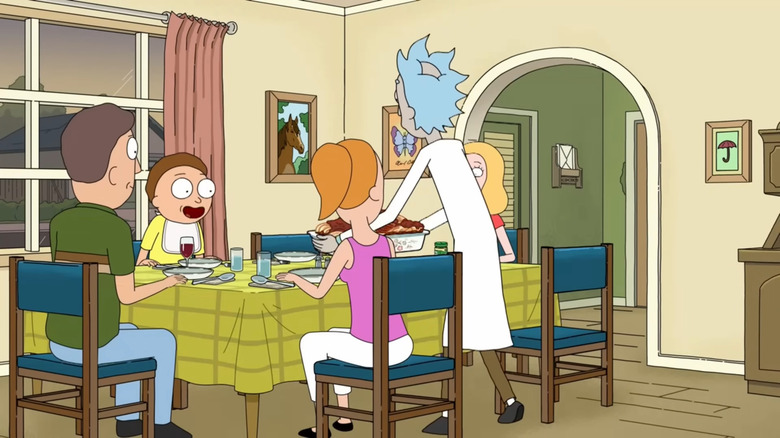Rick And Morty Season 7's Latest Episode Takes Inspiration From One Of The Darkest Sci-Fi Stories Of All Time
Between "Bones and All" and "Yellowjackets," it's been a good few years for lovers of the cannibal genre. What is it about humans eating other humans that captivates audiences so much? Well, I can think of a few explanations, but probably the biggest is the way the concept makes us reflect on our real-world eating habits. Exactly how different is eating a person compared to eating a cow or a pig? We'd certainly love to think it's a big difference, but as the characters on "Yellowjackets" remark on how their friends' roasted body smells like a regular barbecue, it's clear that the gap is a little too small for comfort.
What's the takeaway from such a realization? Well, it's either that eating fellow humans isn't actually that bad — good luck arguing that one in court — or that killing and feasting on animals is indeed pretty terrible despite its mundanity, and it's something we should perhaps reckon with a little bit more. Most of us do feel a little guilty over our complicity in the meat industry, but we often choose not to think about it because, hey, bacon tastes good, and it's not like one person abstaining's gonna change anything. "No snowflake in an avalanche ever feels responsible," the saying goes, but as the latest "Rick and Morty" episode argues, maybe we should feel a little responsible. "That's Amorte" argues that collective inaction is a sin, and it borrows a bit from a certain beloved sci-fi novel to make its point.
Spoilers for "Never Let Me Go" by Kazuo Ishiguro below.
About Never Let Me Go
The big twist in Kazuo Ishiguro's 2005 novel "Never Let Me Go," which is barely a twist since it's revealed so early in the story, is that the quaint little boarding school the main character Kathy (Carey Mulligan in the film) grows up in is not really a boarding school at all. It's more of an organ-harvesting farm. All the kids in the class are essentially clones of other living people; the people they've been cloned from have human rights and get to live happy, free lives, but all the kids in this school are being raised simply to live to adulthood and have their organs harvested one by one. The luckiest students (like main character Kathy) get to make it into their mid-thirties, but the rest of the clones start having their organs harvested much earlier than that.
If this was a more conventional book, the rest of the story might've centered around the characters fighting back against this messed-up system, but "Never Let Me Go" chooses the more realistic, depressing route: The characters just accept their shortened life spans because it's what they're supposed to do. Them being denied a real life, despite having all the emotions of a regular person, is just a normal aspect of the world they live in. To rebel against such a large, long-accepted system feels impossible, so nobody really tries.
What really hammers this point home is the book's final twist, that the treatment of Kathy and her schoolmates is uncommonly comfortable. Most clones aren't treated like people at all, and Kathy's told to be grateful in light of how much more horrific her childhood could've been if she'd been born into one of the many other organ-harvesting farms throughout the country.
Still, somehow, a love story
What prevents "Never Let Me Go" from being a pure exercise in misery is the fact that it's also a bit of a love story. Kathy spends most of the book being in love with (but not knowing she's in love with) her friend Tommy (Andrew Garfield), who's been kept away from her by their mutual friend Ruth (Kiera Knightley). Although Ruth has her sympathetic moments, she's also the most manipulative one in this trio, and near the end she confesses that she's always known Kathy and Tommy were perfect for each other but she kept them apart because she wanted Tommy to herself. Ruth gives them her blessing to get together before she dies, and the final act of the book finally lets Kathy and Tommy be together.
But although Tommy and Kathy's love story stops the book from being too depressing, it's also what makes the finale hit so much harder. Because with Tommy and Kathy's new love comes false hope. They've been told that, in cases where clones are truly in love with each other, that the powers that be might pardon them from their organ-donating responsibilities and allow them to live their regular lives. Tragically this turns out to have never been a real possibility; it's a truth that would've been a lot easier to deal with if a potential alternative hadn't been dangled in front of our characters in the first place.
Their one saving grace is that at least they're suffering for a good cause, sort of: their organs will be used to save other people's lives. As twisted as it is to basically raise a person like a pig for slaughter, at least this society isn't doing this for a trivial reason. Meanwhile, on "Rick and Morty" season 7 ...
Killing people for spaghetti
"That's Amorte" starts off with the Smith family enjoying some delicious spaghetti, made with mysterious ingredients. Morty starts to ask questions, only to immediately discover that, yes, the spaghetti comes from people. The episode wrings quite a bit of comedy out of Morty's discovery, as this reveal is pretty much the worst-case scenario, and it's casually dropped as early as the cold open. Rick's methods for the spaghetti aren't quite as evil as they sound, though: There's a distant alien planet full of humanoid people, except when one of those people kills themselves it releases a chemical in their bodies that turns their insides into spaghetti.
Morty's disturbed by this, and so begins a horrific chain of experiments where he and Rick try to make the production of this spaghetti more morally defensible. First they think to only eat spaghetti from willing participants, like criminals on death row or terminally-ill patients who wish to make use of their body after their death. Morty's able to live with this, until he discovers that the greedy government of this planet has started pressuring its citizens to kill themselves in order to sell more spaghetti. There's a whole suicide-industrial complex established now, all thanks to Morty.
They go through a couple potential solutions, all of them horrible, eventually trying out clones. So begins a quick "Never Let Me Go" parody, name-checked by Rick, where we see two clones in love having a dark existential crisis over how their only purpose in life is to have their bodies harvested. Except in the darkly cynical world of "Rick and Morty," they aren't even dying for the sake of saving any other lives; they're just going through all this so the Smith family can have a tasty meal.
Sometimes love does save the day
In defense of the Smith family, they aren't the only ones willing to commit atrocities for the sake of a snack. The reason why the planet's suicide problem has spiraled out of control is because a hundred other alien societies enjoy the spaghetti too. None of them except Rick and Morty feel fully responsible for what's going on here, so they're all able to maintain some detachment from the horrors of the situation.
In the end, Rick solves the issue by once again taking inspiration from "Never Let Me Go." He finds a man who's terminally ill and willing to end his life, but before he kills himself Rick forces all the other consumers to witness the man's life as it flashes before his eyes. The result is a surprisingly sincere, touching montage where we see this man go through the many trials and triumphs of life, losing and reconciling with his true love over the course of many decades. It's not quite as touching as Andrew Garfield and Carey Mulligan's romance in the 2010 adaptation of "Never Let Me Go," but it's close enough to get the job done. It's a montage that forces everyone who've been waiting for more spaghetti to properly reckon, finally, with what it actually means to eat another person.
When the montage is over, everyone vomits with disgust. Forced to see the full humanity of the person they're eating, they've all fully lost their appetite for that spaghetti, regardless of how delicious they know it is. And so ends the Smith family's dabbling with cannibalism. Lesson learned: Eating people is bad, knowing is half the battle, so on and so forth and what have you. The end, right? Not quite.
Embracing blissful ignorance
Whereas Morty spends most of the episode trying to find a morally defensible way to eat the spaghetti, the rest of the family is just frustrated that Morty told them the truth. Even Beth, who makes the most effort to commend Morty for his moral fortitude, still can't help but snap at him for ruining such a good thing. Things were so much simpler back when none of them knew what they were eating. They're not even mad that Rick was feeding them people without telling them; they're just upset that they can't keep eating it guilt-free. (Those Morty Mindblowers would've really come in handy here.)
The episode ends with Rick treating the family to his special new meal, Salisbury steak. What's actually in the steak? The family no longer wants to know. "Just so you know, it's really bad," Rick tells them. "If you knew, you might kill yourselves." But the episode ends with the family happily laughing amongst themselves as they eat the delicious mystery meat, content with the lack of guilt their ignorance affords them.
"Rick and Morty" has always mined a lot of comedy out of its horror, and this ending is one of the darkest they've ever done. But it's not just gross for grossness's sake; it's also a pretty biting commentary on how we deal with the meat industry. How do most of us choose to deal with the many, many horrific consequences of our meat-heavy diets? Much like the larger society in "Never Let Me Go," or the Smith family in this episode's final moments, we choose to simply look the other way.
New episodes of "Rick and Morty" season 7 premiere every Sunday on Max and Hulu.
